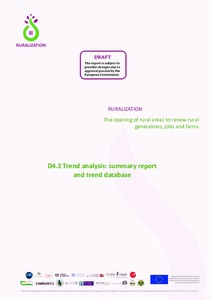| dc.contributor.author | Janc Krzysztof | |
| dc.contributor.author | Volgmann Kati | |
| dc.contributor.author | Kuhmonen Tuomas | |
| dc.contributor.author | Ruuska Pertti | |
| dc.contributor.author | Raczyk Andrzej | |
| dc.contributor.author | Skrzypczyński Robert | |
| dc.contributor.author | Dołzbłasz Sylwia | |
| dc.contributor.author | Ahlmeyer Florian | |
| dc.date.accessioned | 2022-10-28T12:35:31Z | |
| dc.date.available | 2022-10-28T12:35:31Z | |
| dc.identifier.uri | https://www.utupub.fi/handle/10024/160639 | |
| dc.description.abstract | <p>This report is a documentation for an extensive trend identification and assessment process<br>which was carried out by the RURAZATION team. A large diversity of trends was identified in<br>European research reports, scientific journals, futures literature as well as in national sources<br>to avoid the language bias. The approach of the trend analysis was exploratory, not<br>confirmatory or normative. The list of 1,560 trend observations is neither exhaustive nor<br>representative and fully balanced as there is no theory of the future that would guide us to<br>pick up the ‘correct’ trends. Each trend has both positive and negative impacts on specific<br>areas, sectors or actors and observing this diversity is important for understanding the<br>emergence and evolution of alternative futures. The general perspective on the trend analysis<br>has been rural regeneration: what kinds of force fields and developments could shape the<br>futures of rural Europe?<br>Each of the trend observations was assessed by the observer – supported by the source of the<br>trend – for its impacts on different types of rural areas (rural areas within functional urban<br>areas, rural areas in urban proximity and remote rural areas), gender, social capital, migration,<br>access to land, farm structures and farming prospects. Also the drivers of the trends were<br>identified. This process provided a good understanding of the diversity of the impacts of the<br>trends in various contexts.<br>In order to make the results more user-friendly, the findings were synthesised in 60 trend<br>cards. These cards feature the contents, drivers and impacts of 10 megatrends, 20 trends and<br>30 weak signals which could play in the rural regeneration. Obviously, there is no single silver<br>bullet trend that would bring about the desired outcomes for all regions. Rather, hopefully<br>each region, economic sector, policy field, business, decision-maker or citizen could find out<br>the way to benefit from (some of) the trends in specific contexts. This is the role in which the<br>trends cards are meant to serve and in the next steps of the RURALIZATION project this aspect<br>will be assessed in various interactive engagements.<br></p> | |
| dc.language.iso | en | |
| dc.publisher | RURALIZATION Project | |
| dc.title | RURALIZATION Project. The opening of rural areas to renew rural generations, jobs and farms. D4.2 Trend analysis: summary report and trend database | |
| dc.identifier.url | https://ruralization.eu/wp-content/uploads/2021/03/RURALIZATION_D4.2_Trend-analysis_summary-report_v1.0-1.pdf | |
| dc.identifier.urn | URN:NBN:fi-fe2021102752616 | |
| dc.contributor.organization | fi=tulevaisuuden tutkimuskeskus (FFRC)|en=Finland Futures Research Centre (FFRC)| | |
| dc.contributor.organization-code | 2608900 | |
| dc.converis.publication-id | 67447072 | |
| dc.converis.url | https://research.utu.fi/converis/portal/Publication/67447072 | |
| dc.format.pagerange | 1 | |
| dc.format.pagerange | 61 | |
| dc.okm.affiliatedauthor | Kuhmonen, Tuomas | |
| dc.okm.affiliatedauthor | Ruuska, Pertti | |
| dc.okm.discipline | 520 Other social sciences | en_GB |
| dc.okm.discipline | 520 Muut yhteiskuntatieteet | fi_FI |
| dc.okm.internationalcopublication | international co-publication | |
| dc.okm.internationality | International publication | |
| dc.okm.type | Report | |
| dc.publisher.country | Spain | en_GB |
| dc.publisher.country | Espanja | fi_FI |
| dc.publisher.country-code | ES | |
| dc.year.issued | 2021 | |
